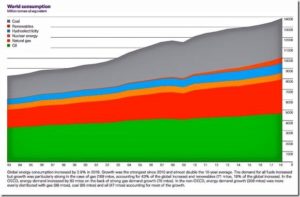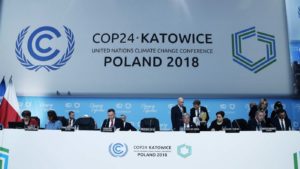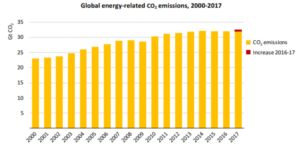by Charles Rotter/UNFCC, April 1, 2020 in WUWT
The COP26 UN climate change conference set to take place in Glasgow in November has been postponed due to COVID-19.
This decision has been taken by the COP Bureau of the UNFCCC (United Nations Framework Convention on Climate Change), with the UK and its Italian partners.
Dates for a rescheduled conference in 2021, hosted in Glasgow by the UK in partnership with Italy, will be set out in due course following further discussion with parties.
In light of the ongoing, worldwide effects of COVID-19, holding an ambitious, inclusive COP26 in November 2020 is no longer possible.
Rescheduling will ensure all parties can focus on the issues to be discussed at this vital conference and allow more time for the necessary preparations to take place. We will continue to work with all involved to increase climate ambition, build resilience and lower emissions.

…
See also here
by D. Woljick, March 15, 2020 in CFACT
The UN’s climate action machinery is on the verge to collapse, beginning this November in Glasgow, Scotland. This time the annual climate summit, called COP 26, is most likely to end in complete disarray, even more than COP 25 did last year in Madrid, Spain.
The failure of COP 25 was widely noted with sadness, but Madrid was a minor COP, with little of substance on the table. In contrast COP 26 is hugely important. When it fails, the UN has to rethink its entire approach to climate action.
One of the six principles stated in CLINTEL’s World Climate Declaration captures the situation very succinctly. It says “Climate policy must respect scientific and economic realities.” If it does not, such a policy must fail. See https://clintel.org/world-climate-declaration/.
Continuer la lecture de UN should change course on climate →
by Samuel Furfari, 16 décembre 2019 in ConnaissanceDesEnergies
La COP25 vient de se terminer avec, comme chaque année, une avancée minime dans la bureaucratie que créé les Nations unies. Dans le même temps, l’Union européenne affirme son intention d’atteindre la neutralité carbone en 2050, c’est-à-dire de vivre dans un équilibre entre les émissions de carbone et l’absorption desdites émissions par des puits de carbone. De l’aveu même du Parlement européen(1), aucun puits de carbone artificiel n’est toutefois en mesure d’éliminer à ce jour le carbone de l’atmosphère à l’échelle nécessaire…
Ce qui est annoncé au niveau européen – sans l’accord de la Pologne qui défend son charbon – est donc en pratique un abandon des énergies fossiles. Notons ici que les hommes politiques ne s’embarrassent pas de la nuance entre neutralité carbone et décarbonation (ne plus émettre de CO2).
…
by Larry Hamlin, July 23, 2019 in WUWT
The UN has been pursuing global emissions policy for decades that are intended to provide for the establishment of global government schemes allowing it to control world emissions.
No fewer than 24 United Nations Climate Change Conferences have been held at various global locations since 1995 under its Conference of the Parties (COP) legal framework.
COP 21 which occurred in November and December 2015 in Paris resulted in the creation of the Paris Agreement that supposedly established global agreement to reduce greenhouse gas emissions and limit future global temperatures that the UN based upon projections from climate models that grossly exaggerate the impact of greenhouse gases on world temperatures.
The UN IPCC acknowledged in its AR3 climate report in 2001 that it is not possible to develop computer models that are capable of predicting future global climate and yet the Paris Agreement based its emissions targets intended for the future using these flawed computer models.
Three additional UN climate conferences have occurred since the Paris Agreement with the last conference being in 2018 in Poland. No success has been achieved in these three conferences in devising specific commitments for emissions reductions targets for the world’s developing nations.
Additionally the U.S. under President Trump wisely withdrew from the Paris Agreement in June of 2017.
Global energy and emissions detailed information for 2018 is now available which includes data encompassing the latest decade of 2008 to 2018. The world energy consumption data from the report is summarized in the graph below.

This latest decade energy and emissions data clearly demonstrates that the developing nations completely dominate global energy and emissions. This includes both present levels as well as future growth. These results also show that the developed nations play a minority role in these measures both presently and in the future.
The results for the last decade show that global energy use grew by 18.5% during the last decade with 98.5% of that energy growth accounted for by the developing nations.
…
…
by Connaissance des Energies, 18 décembre 2018
Trois jours après la clôture de la COP24, l’Agence internationale de l’énergie (AIE) a publié le 18 décembre son rapport annuel consacré au charbon. Elle y souligne le rôle central de cette énergie au niveau mondial et estime que sa consommation globale devrait rester stable dans les 5 prochaines années. Explications.
La consommation de charbon encore appelée à augmenter en Inde et en Asie du Sud-Est
Après deux années de baisse, la consommation mondiale de charbon a augmenté de près de 1% en 2017 et cette hausse devrait se poursuivre en 2018 selon les dernières estimations de l’AIE. Principalement consommé à des fins de production électrique(1), le charbon a encore compté pour 38% de la production mondiale d’électricité en 2017.
Dans son rapport Coal 2018, l’AIE estime que la consommation mondiale de charbon pourrait rester stable d’ici à 2023 : la baisse de la demande envisagée en Europe et en Amérique du Nord serait plus que compensée par une forte croissance de la consommation en Inde et en Asie du Sud-Est selon les prévisions de l’Agence.
…
by Bjorn Lomborg, December 6, 2018 in CAPX
The climate summit in Poland has been given a boost in recent weeks by well-timed climate change reports shaping the news agenda. But if we dig deeper than most of the media did, these reports demonstrate what is wrong with global warming policy discussion.
…

by P. Gosselin, December 22, 2018 in NoTricksZone
By Dr. Dietrich E. Koelle
(German text translated/edited by P Gosselin)
Once again – for the 24th time – a mass climate conference with over 20,000 participants (400 of them from Guinea alone) has come to an end and the politicians and climate officials involved praised its success: “Once again the earth was saved”. It’s all actually quite simple: you only need to reduce CO2 emissions and global temperature drops.
“Strongly decelerated warming”
Reductions have been decided at every conference for 24 years – and emissions have always risen the following year, and done so for 24 years now.

Source: IEA-Report für 2017
But nobody is interested in the fact that despite this, there has hardly been a global rise in temperature in 16 years (since 2002) and record emissions of 500 billion tons of CO2 in this period. Instead there has been a strongly decelerated warming, sometimes even called a “hiatus”. But acknowledging this would possibly jeopardize next year’s planned climate conference.
…
by Samuele Furfari, 20 décembre 2018 in Contrepoints
La COP24 est enfin terminée et, comme à chaque fois, sans aucun résultat concret pour la diminution des émissions de CO2 malgré les cris d’alarmes des ONG environnementales, du Secrétaire général des Nations Unies et des foules de citoyens. Et pourtant dans un an, on va de nouveau nous bassiner les oreilles avec la 25ème COP tandis qu’on observera encore une fois l’augmentation des émissions. Comme à chaque fois, par l’entremise des media, on nous rappelle que notre planète va devenir un enfer comme Vénus, que le niveau de la mer va nous engloutir et que la biodiversité va disparaître.
Rappelons tout d’abord ce fait : aujourd’hui l’Union Européenne ne représente que 11 % des émissions mondiales de CO2, la Chine 28 %, les États-Unis 15 %, l’Inde 7 %, la France 1 % et la Belgique 0,4 %.
…
by P. Homewood, December 12, 2018 in NotaLotofPeopleKnowThat
A must read GWPF analysis of developments in China’s energy policy since the Paris Agreement:
China-U-Turn
Patricia Adams is an economist and the executive director of Probe International, a Toronto based NGO that has been involved in the Chinese environmental movement since its beginnings in the mid-1980s.
Her paper can be read here:
China-U-Turn
She is confirming much of what I have said in recent years. The only thing I would take issue with his her description of there being a U-Turn. In my view, China never had the slightest intention of being serious about cutting emissions.
by P. Homewood, December 2, 2018 in NotaLotofPeopleKnowThat
The BBC have now stopped even trying to camouflage their bias on climate change, with this latest piece of propaganda:
…
Representatives from nearly 200 countries are gathering in Poland for talks on climate change – aimed at breathing new life into the Paris Agreement.
The UN has warned the 2015 Paris accord’s goal of limiting global warming to “well below 2C above pre-industrial levels” is in danger because major economies, including the US and the EU, are falling short of their pledges.
But scientists at the Intergovernmental Panel on Climate Change (IPCC) – the leading international body on global warming – last month argued the 2C Paris pledge didn’t go far enough. The global average temperature rise actually needed to be kept below 1.5C, they said.
So how warm has the world got and what can we do about it?
…
by Antero Ollila, April 16 in WUWT
COP21 does not define the scientific basis of the agreement for the warming effects of the anthropogenic emissions, but it refers to a scenario. This scenario has not been defined in the COP21, but it can be found. The scientific resource of United Nations as well as of the COP21 is IPCC. The exact specification of IPCC is (Summary for Policymakers. In: Climate Change 2014. Mitigation of Climate Change”): “Baseline scenarios, those without additional mitigation, result in global mean surface temperature increases in 2100 from 3.7 °C to 4.8 °C compared to pre-industrial levels (range based on median climate response; the range is 2.5 °C to 7.8 °C when including climate uncertainty)”. Even though IPCC refers to multiple scenarios in the text above, the surface temperature increase to the average value of 4.25 ⁰C means one scenario only.
by D. Wallace-Wells, March 26, 2018 in WUWT
Remember Paris? It was not even two years ago that the celebrated climate accords were signed — defining two degrees of global warming as a must-meet target and rallying all the world’s nations to meet it — and the returns are already dispiritingly grim.
This week, the International Energy Agency announced that carbon emissions grew 1.7 percent in 2017, after an ambiguous couple of years optimists hoped represented a leveling off, or peak; instead, we’re climbing again (…)
by Paul Bert, 20 Novembre 2017, in Contrepoints
15 000 scientifiques lancent un cri d’alarme sur l’état de la planète à la COP23. Penchons-nous sur la rigueur de leur démarche.
Egalement ici
Voir également ici, also see here
by A Préat, H Masson, D. Godefridi, November 18, 2017
Translation of an article originally published in French on Contrepoints:
We are witnessing a holy alliance between Third World ecologists and big finance, orchestrated by the European Union, under the amused gaze of the American giant who has now taken leave of all this masquerade.
Egalement voir ici
La géologie, une science plus que passionnante … et diverse




